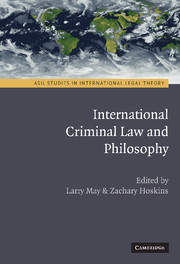Book contents
- Frontmatter
- Contents
- List of Contributors
- Introduction
- PART ONE SOVEREIGNTY AND UNIVERSAL JURISDICTION
- PART TWO CULTURE, GROUPS, AND CORPORATIONS
- PART THREE JUSTICE AND INTERNATIONAL CRIMINAL PROSECUTIONS
- PART FOUR PUNISHMENT AND RECONCILIATION
- 10 The Justification of Punishment in the International Context
- 11 Political Reconciliation and International Criminal Trials
- Index
- References
11 - Political Reconciliation and International Criminal Trials
Published online by Cambridge University Press: 19 January 2010
- Frontmatter
- Contents
- List of Contributors
- Introduction
- PART ONE SOVEREIGNTY AND UNIVERSAL JURISDICTION
- PART TWO CULTURE, GROUPS, AND CORPORATIONS
- PART THREE JUSTICE AND INTERNATIONAL CRIMINAL PROSECUTIONS
- PART FOUR PUNISHMENT AND RECONCILIATION
- 10 The Justification of Punishment in the International Context
- 11 Political Reconciliation and International Criminal Trials
- Index
- References
Summary
INTRODUCTION
My focus in this chapter is on the role of the international community, and of international criminal trials specifically, in the promotion of political reconciliation within transitional societies. The concept of reconciliation refers to the process of repairing damaged relationships. Political reconciliation focuses on the characteristically impersonal relations among members of a political society. Transitional societies are those aspiring to democratize or, more minimally, establish peace after a recent period of repressive rule or civil conflict, characterized by systematic human rights abuses. Examples of recent transitional societies include Iraq, Afghanistan, and Rwanda.
An inquiry into the role of international criminal trials in promoting political reconciliation may seem unpromising. The operations of some hybrid and international criminal tribunals are hampered by insufficient financial resources, lack of international personnel familiar with local cultures and languages, hostility to international personnel in certain transitional contexts, and rejection of the legitimacy of such tribunals. Such limitations call into question the ability of international trials to prosecute and successfully convict perpetrators and counter impunity. They also seemingly strengthen skepticism about the ability of such trials to promote reconciliation.
One objective of this chapter is to temper such skepticism. My thesis is that international criminal trials can contribute to political reconciliation by fostering the social conditions required for law's efficacy. This chapter builds on previous work in which I argue that the cultivation of mutual respect for the rule of law is a constitutive part of the process of political reconciliation.
- Type
- Chapter
- Information
- International Criminal Law and Philosophy , pp. 224 - 244Publisher: Cambridge University PressPrint publication year: 2009
References
- 2
- Cited by



